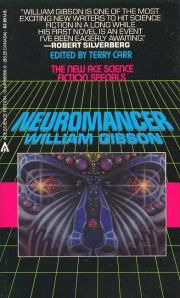 It’s back to science fiction for me, and what a treat William Gibson’s Neuromancer is. Having taken some time away from sci-fi, I suppose I was a little skeptical about coming back to it. However, I devoured Gibson’s novel. Reading it in 2013, it’s easy to overlook just how much Gibson was predicting the coming Internet age. Henry Case, the novel’s protagonist, is a washed-up hacker who is living out what he thinks are the last few days of his life in Chiba City, Japan – a slum and crime haven. He introduces readers to a world where cybernetic implants and prosthetic devices are common-place, where the world is connected across cyberspace (a term that Gibson coined), a world where corporations rule and where the global trade of information exists in a world unto itself. All of this must have seemed way ahead of its time as ARPANET, the Internet’s forerunner, only came into existence in 1969 and in 1983 became a subnet of early forms of the Internet. This was cutting-edge technology and Gibson imagined how it could become a global realm that did not so much offer equality/democracy/information to everyone as to reinforce existing hierarchies. Now that some of the initial triumphalism about the Internet has washed away, it seems increasingly clear that the Internet itself is not a free space, but one that is controlled and contested by many parties. Anyways, I was floored by how much Gibson seems to have gotten Internet culture right. Of course, expecting sci-fi writers to be prophets is unfair as, at heart, I believe most writers are just trying to tell a good story.
It’s back to science fiction for me, and what a treat William Gibson’s Neuromancer is. Having taken some time away from sci-fi, I suppose I was a little skeptical about coming back to it. However, I devoured Gibson’s novel. Reading it in 2013, it’s easy to overlook just how much Gibson was predicting the coming Internet age. Henry Case, the novel’s protagonist, is a washed-up hacker who is living out what he thinks are the last few days of his life in Chiba City, Japan – a slum and crime haven. He introduces readers to a world where cybernetic implants and prosthetic devices are common-place, where the world is connected across cyberspace (a term that Gibson coined), a world where corporations rule and where the global trade of information exists in a world unto itself. All of this must have seemed way ahead of its time as ARPANET, the Internet’s forerunner, only came into existence in 1969 and in 1983 became a subnet of early forms of the Internet. This was cutting-edge technology and Gibson imagined how it could become a global realm that did not so much offer equality/democracy/information to everyone as to reinforce existing hierarchies. Now that some of the initial triumphalism about the Internet has washed away, it seems increasingly clear that the Internet itself is not a free space, but one that is controlled and contested by many parties. Anyways, I was floored by how much Gibson seems to have gotten Internet culture right. Of course, expecting sci-fi writers to be prophets is unfair as, at heart, I believe most writers are just trying to tell a good story.
And that’s what made Neuromancer work for me: it presents a clever story that traverses nearly the entirety of Gibson’s imagined world. Case is approached by Molly, a hired gun with polarized lens implanted over her eyes, with a hacking job that will pay handsomely (and restore the neural damage done to Case by some pissed-off former employers). From here, Case enters into a world-travelling journey, working with a ROM version of a now-dead hacker, to prepare for a hacking run against one of the largest corporations and its monolithic AI. Oh yeah, Gibson is all over AI in this novel, but it’s not a fear of robo-pocalypse, but something far more interesting.
I think one of the most interesting things about reading this novel was seeing how much it actually resembles Ridley Scott’s 1982 film Blade Runner (a loose adaptation of Philip K. Dick’s Do Androids Dream of Electric Sheep?). I read on Wikipedia that when Gibson saw the first 20 minutes he was in despair as he felt like every reviewer would see his novel as a rip-off of that film. I don’t think that this happened (Neuromancer pulled a triple crown of awards, winning the Nebula, Philip K. Dick, and Hugo Awards), but it is amazing how close these two worlds line up. I’m not sure why this happened, but I am guessing that in the early 1980s, something about Japanese technology, mixed with a good dose of yellow peril (racist fear of an Asian wave) helped to concoct the perfect cultural context for Scott and Gibson to work with. At the same time, Gibson’s novel leaves Japan for Turkey and the United States before ending up in a space station. I feel like someone has probably written a Master’s thesis on the convergence of these two seminal sci-fi works.
Overall, Gibson’s Neuromancer is a great read. It is fast-paced and tosses in a number of twists that keep you guessing while also being intellectually stimulating.
I highly recommend this novel to sci-fi fans. Of course, in saying this I am probably preaching to the choir as this is already a well-loved sci-fi classic.
Gibson, William. Neuromancer. New York: Ace Science Fiction, 1984. Print.